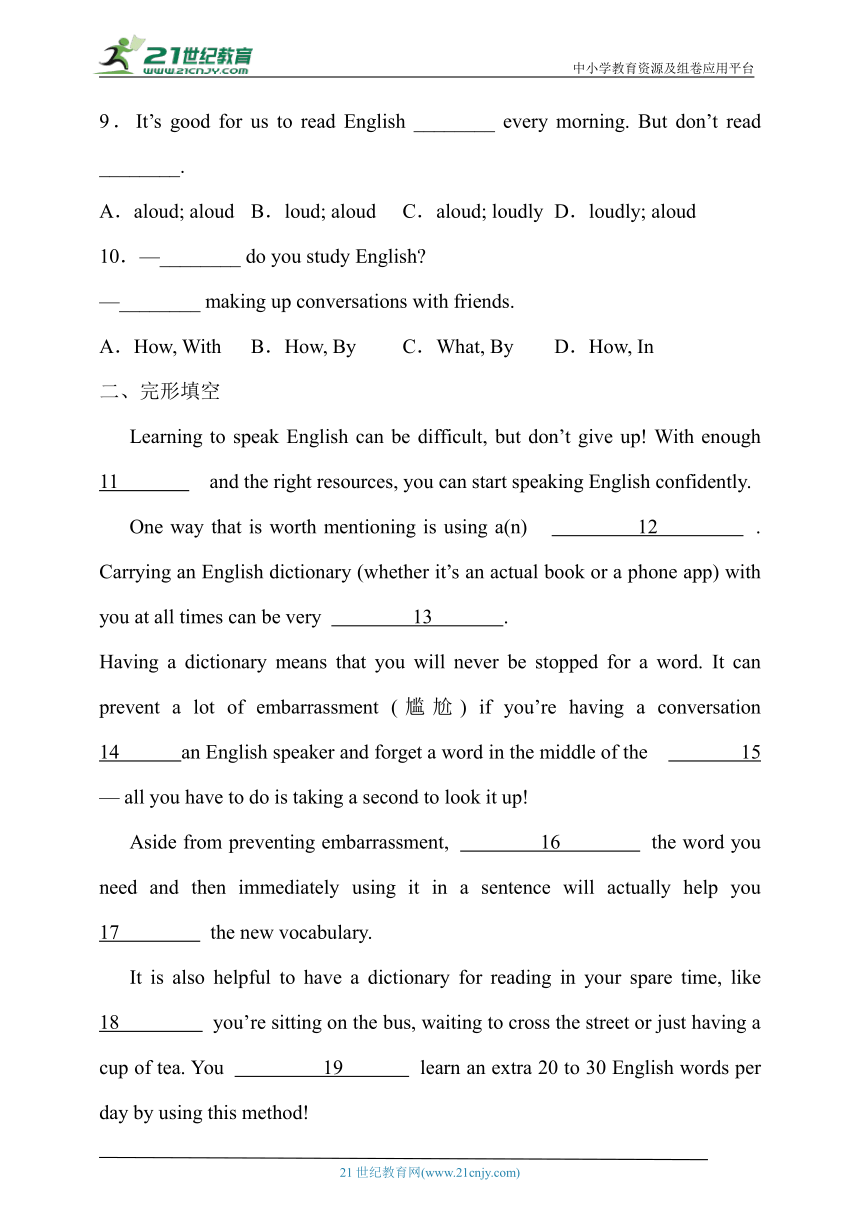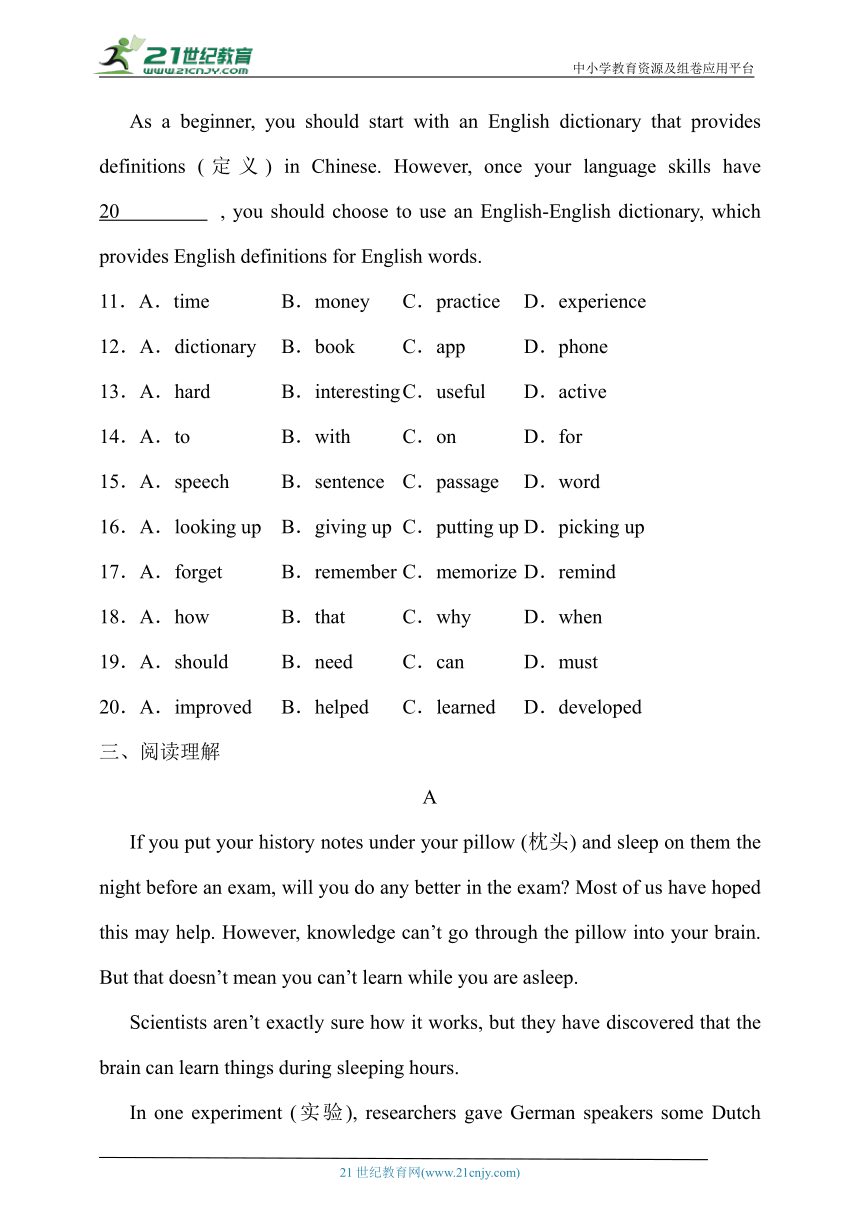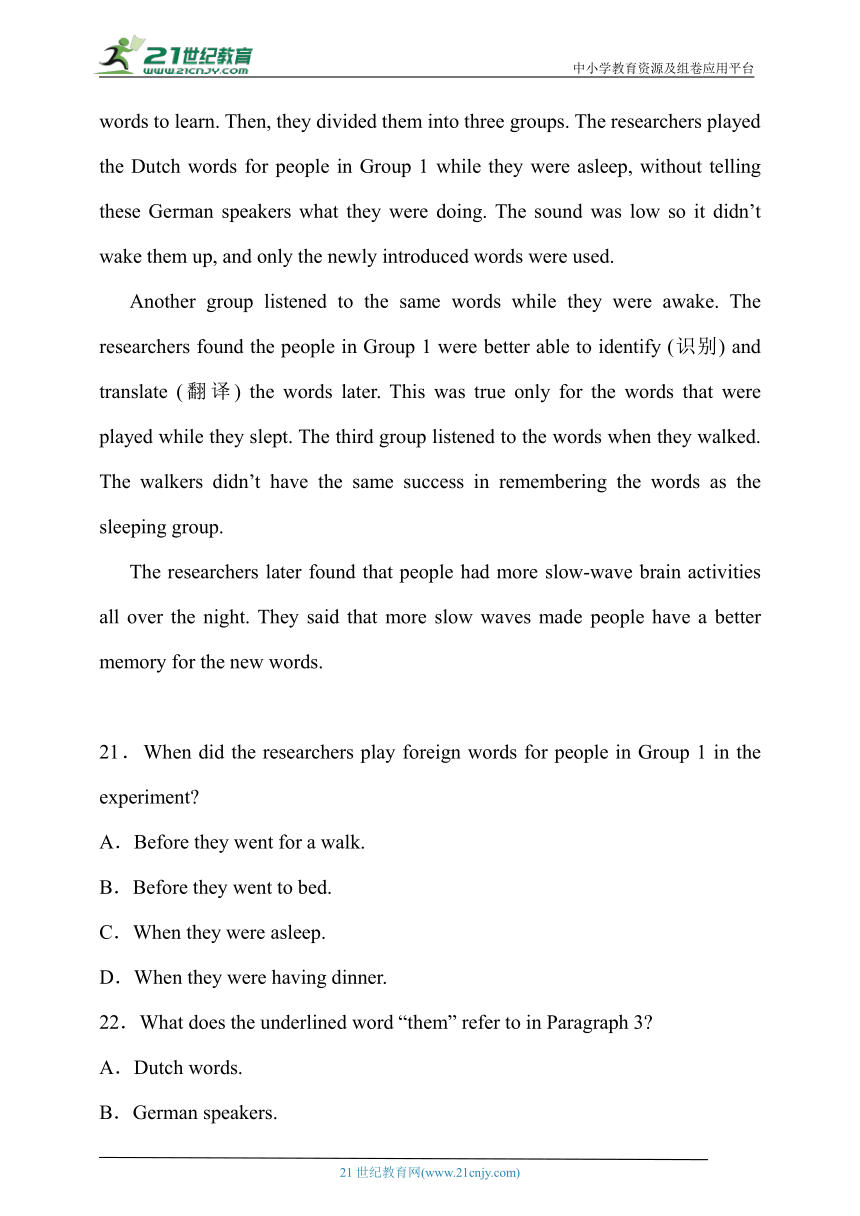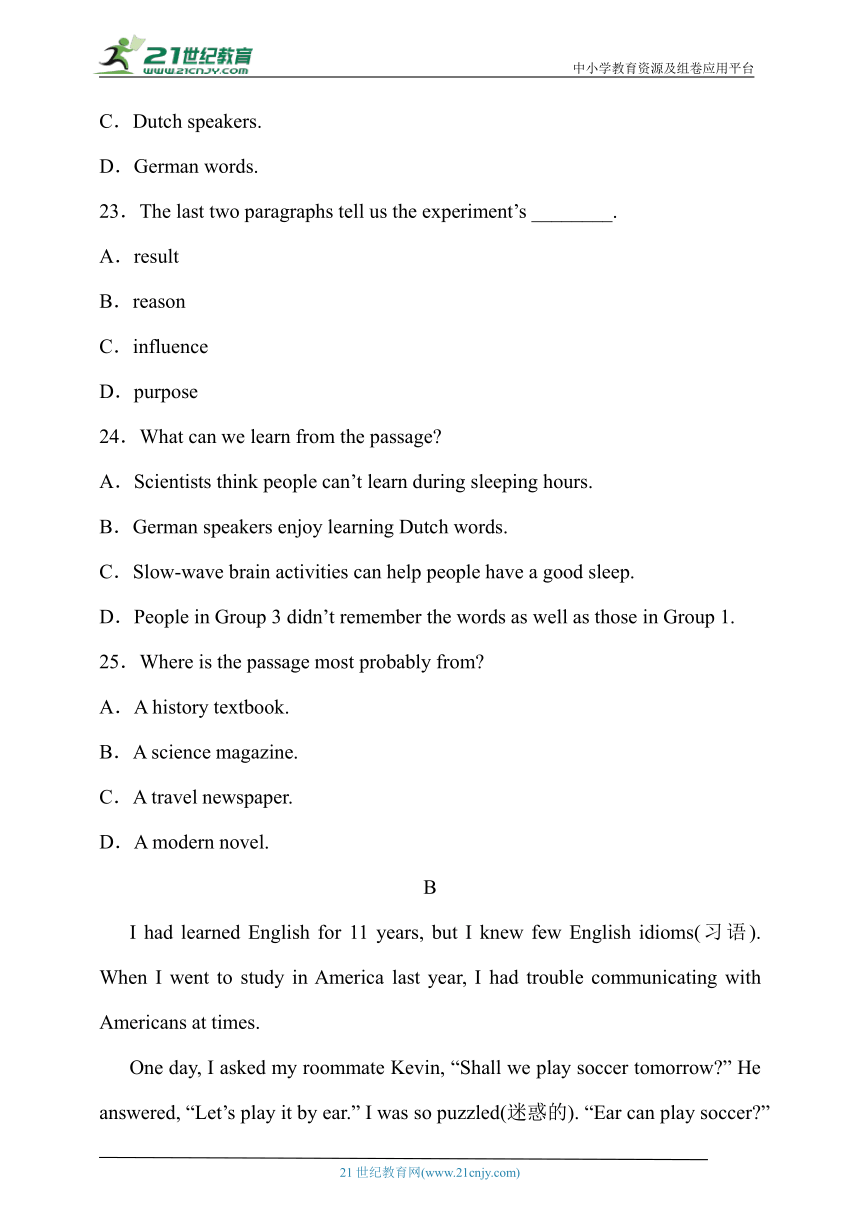Unit 1 How can we become good learners? 基础检测(含答案)
文档属性
| 名称 | Unit 1 How can we become good learners? 基础检测(含答案) |

|
|
| 格式 | docx | ||
| 文件大小 | 283.6KB | ||
| 资源类型 | 试卷 | ||
| 版本资源 | 人教新目标(Go for it)版 | ||
| 科目 | 英语 | ||
| 更新时间 | 2024-09-18 00:00:00 | ||
图片预览





文档简介
中小学教育资源及组卷应用平台
Unit 1 How can we become good learners
基础检测
一、单项选择
1.You don’t have to _______ every new word in the dictionary while reading.
A.look up B.look for C.look at D.look out
2.No hurry! Please __________ your time.
A.take B.save C.set D.value
3.He works very hard _______ present. However, he used to pay no attention ______ his lessons.
A.at; to B.to; to C.to; at D.at; at
4.—How many eggs has that hen __________
—Nearly one hundred.
A.lay B.laid C.lied D.lain
5.—Jack won first prize in the competition.
—Yes. The news ________ really quickly. Now everybody in our school has known it.
A.spread B.left C.connected D.jumped
6.The boats take different lines, but they all _______ in the same place.
A.give up B.clear up C.end up D.make up
7.I admire you for ________ such a difficult job on time.
A.finish B.to finish C.finishing D.finished
8.__________ comes here, you should say hello to him.
A.Whatever B.Whoever C.Wherever D.Whomever
9.It’s good for us to read English ________ every morning. But don’t read ________.
A.aloud; aloud B.loud; aloud C.aloud; loudly D.loudly; aloud
10.—________ do you study English
—________ making up conversations with friends.
A.How, With B.How, By C.What, By D.How, In
二、完形填空
Learning to speak English can be difficult, but don’t give up! With enough 11 and the right resources, you can start speaking English confidently.
One way that is worth mentioning is using a(n) 12 . Carrying an English dictionary (whether it’s an actual book or a phone app) with you at all times can be very 13 .
Having a dictionary means that you will never be stopped for a word. It can prevent a lot of embarrassment (尴尬) if you’re having a conversation 14 an English speaker and forget a word in the middle of the 15 — all you have to do is taking a second to look it up!
Aside from preventing embarrassment, 16 the word you need and then immediately using it in a sentence will actually help you 17 the new vocabulary.
It is also helpful to have a dictionary for reading in your spare time, like 18 you’re sitting on the bus, waiting to cross the street or just having a cup of tea. You 19 learn an extra 20 to 30 English words per day by using this method!
As a beginner, you should start with an English dictionary that provides definitions (定义) in Chinese. However, once your language skills have 20 , you should choose to use an English-English dictionary, which provides English definitions for English words.
11.A.time B.money C.practice D.experience
12.A.dictionary B.book C.app D.phone
13.A.hard B.interesting C.useful D.active
14.A.to B.with C.on D.for
15.A.speech B.sentence C.passage D.word
16.A.looking up B.giving up C.putting up D.picking up
17.A.forget B.remember C.memorize D.remind
18.A.how B.that C.why D.when
19.A.should B.need C.can D.must
20.A.improved B.helped C.learned D.developed
三、阅读理解
A
If you put your history notes under your pillow (枕头) and sleep on them the night before an exam, will you do any better in the exam Most of us have hoped this may help. However, knowledge can’t go through the pillow into your brain. But that doesn’t mean you can’t learn while you are asleep.
Scientists aren’t exactly sure how it works, but they have discovered that the brain can learn things during sleeping hours.
In one experiment (实验), researchers gave German speakers some Dutch words to learn. Then, they divided them into three groups. The researchers played the Dutch words for people in Group 1 while they were asleep, without telling these German speakers what they were doing. The sound was low so it didn’t wake them up, and only the newly introduced words were used.
Another group listened to the same words while they were awake. The researchers found the people in Group 1 were better able to identify (识别) and translate (翻译) the words later. This was true only for the words that were played while they slept. The third group listened to the words when they walked. The walkers didn’t have the same success in remembering the words as the sleeping group.
The researchers later found that people had more slow-wave brain activities all over the night. They said that more slow waves made people have a better memory for the new words.
21.When did the researchers play foreign words for people in Group 1 in the experiment
A.Before they went for a walk.
B.Before they went to bed.
C.When they were asleep.
D.When they were having dinner.
22.What does the underlined word “them” refer to in Paragraph 3
A.Dutch words.
B.German speakers.
C.Dutch speakers.
D.German words.
23.The last two paragraphs tell us the experiment’s ________.
A.result
B.reason
C.influence
D.purpose
24.What can we learn from the passage
A.Scientists think people can’t learn during sleeping hours.
B.German speakers enjoy learning Dutch words.
C.Slow-wave brain activities can help people have a good sleep.
D.People in Group 3 didn’t remember the words as well as those in Group 1.
25.Where is the passage most probably from
A.A history textbook.
B.A science magazine.
C.A travel newspaper.
D.A modern novel.
B
I had learned English for 11 years, but I knew few English idioms(习语). When I went to study in America last year, I had trouble communicating with Americans at times.
One day, I asked my roommate Kevin, “Shall we play soccer tomorrow ” He answered, “Let’s play it by ear.” I was so puzzled(迷惑的). “Ear can play soccer ” I asked. He explained, “It means let’s see how things go. The weather report says tomorrow is rainy.”
Last October, I was waiting for the bus in a station. Beside me sat a young man. When he knew I was Chinese, he asked me something about the Great Wall. I told him, “The Great Wall is more than 20,000 kilometers long.” The man said, “You don’t say.” I was surprised. “There must be something wrong with him,” I thought. Later, I knew he meant “Really ”
I was once invited to my classmate’s home. His mother said to me, “Break your ice, please.” I wondered, “You didn’t give me any ice.” Later my classmate told me she meant I could make myself relaxed in their home.
From then on, I realized English idioms had special meanings. It was wrong to translate them word by word.
26.Why did the writer go to America last year
A.He studied there.
B.He spent holidays there.
C.He did business there.
D.He visited his relatives there.
27.When Kevin says “Let’s play it by ear”, he wants to tell the writer________.
A.he is good at listening
B.he could play soccer with his ear
C.he refuses the writer’s suggestion
D.whether to play soccer depends on the weather
28.From the third paragraph, we can know ________.
A.the writer wanted to take a train
B.the young man knew the Great Wall well
C.the young man was the writer’s good friend
D.the young man was surprised to know how long the Great Wall was
29.“Break your ice.” means “________” in the passage.
A.Help yourself.
B.It’s polite to break the ice.
C.Ice can make you cool here.
D.There must be something wrong.
30.What’s the best title for the passage
A.The Most Useful Language — English
B.The Importance of Knowing English Idioms
C.Differences Between Universities in America
D.How to Communicate with Americans
四、补全对话
请通读下面对话,根据对话内容,从方框内的选项中选出能填入空白处的最佳选项,并将字母编号填写在相应的横线上,选项中有一项为多余选项。
Bill: Hi, Kate! Did you go to the concert last night
Kate: Yes. 31.
Bill: 32.
Kate: Wonderful. Many famous singers sang at the concert. 33.
Bill: What does it mean
Kate: 34. You know, many children in the world don’t have enough food.
Bill: 35.
Kate: I think people all over the world should help them.
Bill: I agree with you. And let’s do something to help.
A.That’s true.
B.How did you like it
C.The concert ended at 10:00 p.m.
D.I went there with my parents.
E.It was called “Saving the Children”.
F.The concert was held for collecting money for poor children.
五、单词拼写
第一节 首字母填空
36.The little boy is quite shy. He is t__________ of speaking in public.
37.It may take you a long time to find a s__________ to the problem.
38.It is w________ of you to ask the teacher for help.
39.We are learning English, so we are all English l__________.
40.The population of this town has i_______ a lot in the past few years.
第二节 适当形式填空
41.It’s __________ (amaze) how much it helps.
42.Are you excited about __________ (travel) to Asia
43.It’s not easy for me __________ (follow) the teachers because they speak too quickly.
44.My parents are very __________ (impress) by my great progress.
45.Have you ever ________ (join) an English club
六、完成句子
46.这些明星鼓励年轻人努力工作去实现他们的梦想。
These stars _______ young people _______ _______ _______ to achieve their dreams.
47.我认为四月是泰国最热的月份。
I ______ ______ April is the hottest month in Thailand.
48.________ can we ________ good learners
我们怎样才能成为优秀的学习者?
49.________ ________ the food is in HongKong!
香港的食物真好吃!
50.旅行有趣,但我们应该注意我们的安全。
Traveling is fun, but we should ________ ________ ________ our safety.
七、书面表达
51.假如你的同学Mark在学习英语方面遇到了困难,请你给他提出一些建议。请以“How to learn English”为题写一篇短文,70词左右,标题、开头和结尾已给出,不计入总词数。
How to learn English
How can you learn English well Here are my suggestions.
_________________________________________________________________________________________________________________________________________________________________________________________________________________________________________________________________________________________________________________________________________________________________________________________________________________________________________________________________________________________________________________________________________________________________________________________________________________________________________________________________
I hope these suggestions can help you.
【答案】
一、1-10 A A ABA CCDCB
二、11-20 CACBB ACDCA
三、21-30 CBADB ADDAB
四、31-35 DBEFA
第一节36.terrified 37.solve 38.wise 39.learners 40.increased
41.amazing 42.to travel 43.to follow 44.impressed 45.joined
六、46.encourage to work hard
think that
How become
How delicious
pay attention to
七、;略
21世纪教育网 www.21cnjy.com 精品试卷·第 2 页 (共 2 页)
21世纪教育网(www.21cnjy.com)
Unit 1 How can we become good learners
基础检测
一、单项选择
1.You don’t have to _______ every new word in the dictionary while reading.
A.look up B.look for C.look at D.look out
2.No hurry! Please __________ your time.
A.take B.save C.set D.value
3.He works very hard _______ present. However, he used to pay no attention ______ his lessons.
A.at; to B.to; to C.to; at D.at; at
4.—How many eggs has that hen __________
—Nearly one hundred.
A.lay B.laid C.lied D.lain
5.—Jack won first prize in the competition.
—Yes. The news ________ really quickly. Now everybody in our school has known it.
A.spread B.left C.connected D.jumped
6.The boats take different lines, but they all _______ in the same place.
A.give up B.clear up C.end up D.make up
7.I admire you for ________ such a difficult job on time.
A.finish B.to finish C.finishing D.finished
8.__________ comes here, you should say hello to him.
A.Whatever B.Whoever C.Wherever D.Whomever
9.It’s good for us to read English ________ every morning. But don’t read ________.
A.aloud; aloud B.loud; aloud C.aloud; loudly D.loudly; aloud
10.—________ do you study English
—________ making up conversations with friends.
A.How, With B.How, By C.What, By D.How, In
二、完形填空
Learning to speak English can be difficult, but don’t give up! With enough 11 and the right resources, you can start speaking English confidently.
One way that is worth mentioning is using a(n) 12 . Carrying an English dictionary (whether it’s an actual book or a phone app) with you at all times can be very 13 .
Having a dictionary means that you will never be stopped for a word. It can prevent a lot of embarrassment (尴尬) if you’re having a conversation 14 an English speaker and forget a word in the middle of the 15 — all you have to do is taking a second to look it up!
Aside from preventing embarrassment, 16 the word you need and then immediately using it in a sentence will actually help you 17 the new vocabulary.
It is also helpful to have a dictionary for reading in your spare time, like 18 you’re sitting on the bus, waiting to cross the street or just having a cup of tea. You 19 learn an extra 20 to 30 English words per day by using this method!
As a beginner, you should start with an English dictionary that provides definitions (定义) in Chinese. However, once your language skills have 20 , you should choose to use an English-English dictionary, which provides English definitions for English words.
11.A.time B.money C.practice D.experience
12.A.dictionary B.book C.app D.phone
13.A.hard B.interesting C.useful D.active
14.A.to B.with C.on D.for
15.A.speech B.sentence C.passage D.word
16.A.looking up B.giving up C.putting up D.picking up
17.A.forget B.remember C.memorize D.remind
18.A.how B.that C.why D.when
19.A.should B.need C.can D.must
20.A.improved B.helped C.learned D.developed
三、阅读理解
A
If you put your history notes under your pillow (枕头) and sleep on them the night before an exam, will you do any better in the exam Most of us have hoped this may help. However, knowledge can’t go through the pillow into your brain. But that doesn’t mean you can’t learn while you are asleep.
Scientists aren’t exactly sure how it works, but they have discovered that the brain can learn things during sleeping hours.
In one experiment (实验), researchers gave German speakers some Dutch words to learn. Then, they divided them into three groups. The researchers played the Dutch words for people in Group 1 while they were asleep, without telling these German speakers what they were doing. The sound was low so it didn’t wake them up, and only the newly introduced words were used.
Another group listened to the same words while they were awake. The researchers found the people in Group 1 were better able to identify (识别) and translate (翻译) the words later. This was true only for the words that were played while they slept. The third group listened to the words when they walked. The walkers didn’t have the same success in remembering the words as the sleeping group.
The researchers later found that people had more slow-wave brain activities all over the night. They said that more slow waves made people have a better memory for the new words.
21.When did the researchers play foreign words for people in Group 1 in the experiment
A.Before they went for a walk.
B.Before they went to bed.
C.When they were asleep.
D.When they were having dinner.
22.What does the underlined word “them” refer to in Paragraph 3
A.Dutch words.
B.German speakers.
C.Dutch speakers.
D.German words.
23.The last two paragraphs tell us the experiment’s ________.
A.result
B.reason
C.influence
D.purpose
24.What can we learn from the passage
A.Scientists think people can’t learn during sleeping hours.
B.German speakers enjoy learning Dutch words.
C.Slow-wave brain activities can help people have a good sleep.
D.People in Group 3 didn’t remember the words as well as those in Group 1.
25.Where is the passage most probably from
A.A history textbook.
B.A science magazine.
C.A travel newspaper.
D.A modern novel.
B
I had learned English for 11 years, but I knew few English idioms(习语). When I went to study in America last year, I had trouble communicating with Americans at times.
One day, I asked my roommate Kevin, “Shall we play soccer tomorrow ” He answered, “Let’s play it by ear.” I was so puzzled(迷惑的). “Ear can play soccer ” I asked. He explained, “It means let’s see how things go. The weather report says tomorrow is rainy.”
Last October, I was waiting for the bus in a station. Beside me sat a young man. When he knew I was Chinese, he asked me something about the Great Wall. I told him, “The Great Wall is more than 20,000 kilometers long.” The man said, “You don’t say.” I was surprised. “There must be something wrong with him,” I thought. Later, I knew he meant “Really ”
I was once invited to my classmate’s home. His mother said to me, “Break your ice, please.” I wondered, “You didn’t give me any ice.” Later my classmate told me she meant I could make myself relaxed in their home.
From then on, I realized English idioms had special meanings. It was wrong to translate them word by word.
26.Why did the writer go to America last year
A.He studied there.
B.He spent holidays there.
C.He did business there.
D.He visited his relatives there.
27.When Kevin says “Let’s play it by ear”, he wants to tell the writer________.
A.he is good at listening
B.he could play soccer with his ear
C.he refuses the writer’s suggestion
D.whether to play soccer depends on the weather
28.From the third paragraph, we can know ________.
A.the writer wanted to take a train
B.the young man knew the Great Wall well
C.the young man was the writer’s good friend
D.the young man was surprised to know how long the Great Wall was
29.“Break your ice.” means “________” in the passage.
A.Help yourself.
B.It’s polite to break the ice.
C.Ice can make you cool here.
D.There must be something wrong.
30.What’s the best title for the passage
A.The Most Useful Language — English
B.The Importance of Knowing English Idioms
C.Differences Between Universities in America
D.How to Communicate with Americans
四、补全对话
请通读下面对话,根据对话内容,从方框内的选项中选出能填入空白处的最佳选项,并将字母编号填写在相应的横线上,选项中有一项为多余选项。
Bill: Hi, Kate! Did you go to the concert last night
Kate: Yes. 31.
Bill: 32.
Kate: Wonderful. Many famous singers sang at the concert. 33.
Bill: What does it mean
Kate: 34. You know, many children in the world don’t have enough food.
Bill: 35.
Kate: I think people all over the world should help them.
Bill: I agree with you. And let’s do something to help.
A.That’s true.
B.How did you like it
C.The concert ended at 10:00 p.m.
D.I went there with my parents.
E.It was called “Saving the Children”.
F.The concert was held for collecting money for poor children.
五、单词拼写
第一节 首字母填空
36.The little boy is quite shy. He is t__________ of speaking in public.
37.It may take you a long time to find a s__________ to the problem.
38.It is w________ of you to ask the teacher for help.
39.We are learning English, so we are all English l__________.
40.The population of this town has i_______ a lot in the past few years.
第二节 适当形式填空
41.It’s __________ (amaze) how much it helps.
42.Are you excited about __________ (travel) to Asia
43.It’s not easy for me __________ (follow) the teachers because they speak too quickly.
44.My parents are very __________ (impress) by my great progress.
45.Have you ever ________ (join) an English club
六、完成句子
46.这些明星鼓励年轻人努力工作去实现他们的梦想。
These stars _______ young people _______ _______ _______ to achieve their dreams.
47.我认为四月是泰国最热的月份。
I ______ ______ April is the hottest month in Thailand.
48.________ can we ________ good learners
我们怎样才能成为优秀的学习者?
49.________ ________ the food is in HongKong!
香港的食物真好吃!
50.旅行有趣,但我们应该注意我们的安全。
Traveling is fun, but we should ________ ________ ________ our safety.
七、书面表达
51.假如你的同学Mark在学习英语方面遇到了困难,请你给他提出一些建议。请以“How to learn English”为题写一篇短文,70词左右,标题、开头和结尾已给出,不计入总词数。
How to learn English
How can you learn English well Here are my suggestions.
_________________________________________________________________________________________________________________________________________________________________________________________________________________________________________________________________________________________________________________________________________________________________________________________________________________________________________________________________________________________________________________________________________________________________________________________________________________________________________________________________
I hope these suggestions can help you.
【答案】
一、1-10 A A ABA CCDCB
二、11-20 CACBB ACDCA
三、21-30 CBADB ADDAB
四、31-35 DBEFA
第一节36.terrified 37.solve 38.wise 39.learners 40.increased
41.amazing 42.to travel 43.to follow 44.impressed 45.joined
六、46.encourage to work hard
think that
How become
How delicious
pay attention to
七、;略
21世纪教育网 www.21cnjy.com 精品试卷·第 2 页 (共 2 页)
21世纪教育网(www.21cnjy.com)
同课章节目录
- Unit 1 How can we become good learners.
- Section A
- Section B
- Unit 2 I think that mooncakes are delicious!
- Section A
- Section B
- Unit 3 Could you please tell me where the restroom
- Section A
- Section B
- Unit 4 I used to be afraid of the dark.
- Section A
- Section B
- Unit 5 What are the shirts made of?
- Section A
- Section B
- Review of Units 1-5
- Unit 6 When was it invented?
- Section A
- Section B
- Unit 7 Teenagers should be allowed to choose their
- Section A
- Section B
- Unit 8 It must belong to Carla.
- Section A
- Section B
- Unit 9 I like music that I can dance to.
- Section A
- Section B
- Unit 10 You're supposed to shake hands.
- Section A
- Section B
- Review of Units 6-10
- Unit 11 Sad movies make me cry.
- Section A
- Section B
- Unit 12 Life is full of the unexpected
- Section A
- Section B
- Unit 13 We're trying to save the earth!
- Section A
- Section B
- Unit 14 I remember meeting all of you in Grade 7.
- Section A
- Section B
- Review of Units 11-14
